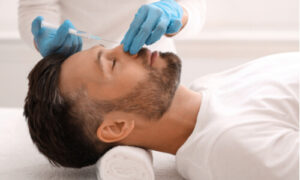It is pretty fascinating to think that everyone can alter their nose in terms of shape and structure in today’s technology. In fact, many people claim that having a nose job offers a renewed feeling of empowerment. Thanks to the introduction of innovative techniques in plastic surgery, anyone can now integrate harmony in their facial features. However, while many get inspired by these practices, others face fear and doubts about the procedure. One of the most common inquiries we often get is if the surgery can be associated with pain and discomfort. So, does rhinoplasty hurt? Let’s find out.
Overview
If this is your first time undergoing a rhinoplasty procedure, it is totally normal to feel nervous. Planning for the surgery, especially if you haven’t had any, can bring many questions into your mind. After all, you may not be so sure about what to anticipate. Luckily, our doctors at Rhinoplasty Melbourne are glad to take the time to provide us with an overview of what a rhinoplasty surgery is and how each procedure takes place. So, to reshape your perspective, Let’s start by discussing the basic information about a nose job.
Understanding Rhinoplasty Surgery
There are several various types of nose jobs, but the most frequent is an open rhinoplasty procedure. In this method, a surgeon creates a small incision between the nostrils. This opening allows the surgeon to remove the skin from the other components. It is essential in altering the shape and placement of cartilage underneath. After this point, repositioning of the skin happens.
An open rhinoplasty procedure is fairly similar to other kinds of nose jobs. It is a common choice by many because of its fast and easy process. Often, it is done as an outpatient treatment. It means that patients can go home right after the procedure.
Does Rhinoplasty Hurt?

On the other hand, patients are also curious about what to expect after treatment. Therefore, it is crucial to set clear boundaries about what could happen following the procedure.
Rhinoplasty Recovery Process
Bruising, swelling and slight bleeding are all common side effects of a nose job. These occur during the recovery period and appear hours and days after the procedure. But what about discomfort?
According to several pieces of research, pain after rhinoplasty is relatively minimal. Thus, it is much more appropriate to talk about rhinoplasty recovery in terms of congestion-related concerns. Having plastic surgery on your nose could cause disruption to your breathing patterns, especially during the first few days of recovery.
As the anesthesia starts to wear off, it is normal for the patient to feel minor blockage on their nose. This condition prompts the patient to breathe through their mouth for quite some time. Additionally, patients may also notice a certain amount of pressure building up around their temples or ears.
How Do You Manage Rhinoplasty Discomfort?
Typically, a nose job does not hurt. However, every person is born differently. Therefore, it is not surprising for some to feel pain and discomfort due to sinus pressure and congestion. Consequently, it would be best to make sure that your surgeon will walk you through the essential tips for pain management.
During your initial consultation, it is wise to ask your surgeon about your concerns and see if they can address all of your questions to your satisfaction. Moreover, here are some ways that will help you successfully accomplish your plastic surgery:
Take Medications
Your surgeon may provide you with prescription medications to minimise discomfort. However, some patients prefer to use over-the-counter treatments to relieve minimal pain.
Elevate your Head
Dealing with the challenges brought by nasal congestion might be a more significant concern. In the first few days after surgery, experts will recommend that you sleep with your head raised. This might assist you to quickly resume your normal breathing and get back to your regular routine.
 Use a Humidifier
Use a Humidifier
It is also necessary to use a humidifier. You can keep this machine next to your bed as you rest. Doing so will calm your nasal passages and appease your airways. Since you breathe through your mouth in the first few days of recovery, it might cause dryness to your oral route. Using a humidifier can help restore your throat’s average moisture and protect your voice from hoarseness.
Stick to Honey and Tea
Aside from having a dry throat, dry lips and dry mouth are among the most significant adverse effects of rhinoplasty. Therefore, before your surgery, make sure that you have enough tea and honey in your kitchen. Others also recommend stocking up on some lip balm to prevent wounding your lips. Moreover, it is also a good idea to stay hydrated during the recovery period.
Save Time to Rest
Rest is, of course, just as necessary as everything else. In the first couple of days, you’ll probably experience slight discomfort and perhaps little pain. You should dedicate this time to rest and relaxation. The more you take it easy, the faster you’ll recover and get back to your regular routines.
Wrapping It Up
Having a nose job is a thrilling experience. It opens up a new world where you can feel more confident about your looks. However, there are minor adjustments in the beginning. As you embrace your new and improved appearance, changes are inevitable. Does rhinoplasty hurt? Yes, at first, just like any other surgical procedure. Don’t allow worries regarding the procedure to dampen your spirits. Instead, feel free to contact us at (03) 9068 5793.
Please don’t hesitate to reach out to us and schedule your consultation. We are glad to be your partner towards a hassle-free nose job experience for a better, more appealing version of you.


 Use a Humidifier
Use a Humidifier
Recent Comments